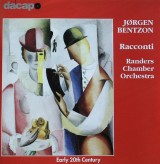TALES FROM BENTZON
Peter Dale listens to some little-known Danish chamber music
|
 |
Bentzon was a pupil of Nielsen, a friend of Karg-Elert and Hindemith,
and a life-long champion of the ideal that music should belong to everyone.
To this end he founded and directed for years the Copenhagen People's Music
School. He wrote an opera, Saturnalia, whose suit is still often
performed, two symphonies (the first intriguingly 'based on motifs from
the novels of Dickens') and much chamber music foremost among which are
these six Racconti. Bentzon had the idea that if instruments were allowed
to behave according to their character rather than their context then the
resulting music would inevitably generate a rather different sort of polyphony.
For example, the hierarchy of pitch in a wind quintet or a string quartet
would not govern the distribution of thematic material to the extent that
it traditionally always has done, even in such a homogeneous group as strings.
The viola would no longer be relegated to the role of wallflower, as is
almost always the case. The double bass might be admitted over the hallowed
threshold of the string quartet and would not, moreover, necessarily have
to continue with its traditional pretence to be a sort of cello manque,
but could truly speak for itself, and so on. The opportunities to which
Bentzon's idea gives access are actually very interesting indeed.
The compositional method to which the idea gave rise Bentzon called 'character
polyphony'. There is much less attempt than usual to blend really quite
heterogeneous wind instruments into homophonic textures. There is much less
conversational polyphony of the structured, imitative patterning that we
expect even now as heirs to the classical tradition, and much more cut and
thrust, interjection and riposte, witty non-sequiturs, and even babble at
times. It is fascinating music – not so much a process governed by
the journey of themes from their opening statements to their persuaded conclusions,
as a relaxed stroll among democratically equal voices riding their own hobby-horses,
flying their own kites and listening to each other politely but not hierarchically.
The prominence of themes recedes in favour of individual character. Perhaps
unexpectedly, the music doesn’t sound the least bit odd or eccentric
but very, very natural, in the manner of a conversation full of unscripted
episodes. Over the short span of the ten minutes or so that each Racconto
lasts, the compositional principle works well, though at greater length
(which, wisely, Bentzon never attempted)one could imagine increasingly severe
structural difficulties.
The six pieces - or 'Tales' as we should translate Racconti - must endear
themselves to musicians whose situation prevents the mustering of more conventional
teams such as the string quartet – a common enough state of affairs
which was virtually systematised by Hindemith's Gebrauchmusik, and also,
most famously, was the occasion of Messiaen's Quartet for the End of
Time. Bentzon scores his pieces variously for flute, alto saxophone,
bassoon and double bass, or violin, cor anglais and piano, for example.
Only the fifth and sixth are for 'regular' groupings: wind quintet and string
quartet respectively.
The method may be idiosyncratic but the language is conventional enough
- tonal not conspicuously nationalistic (Danish, of course, in this case,
and thoroughly approachable.) Nielsen's marvellous Wind Quintet casts a
benign and very light shadow over the music here and there. Hindemith's
neo-baroque counterpoint makes some appearances too.
No 6, the last to be written (in 1949)and perhaps the most conventional
of the set, was dedicated to Vagn Holmboe, the finest of the next generation
of Danish composers, but Bentzon doesn't sound like Holmboe here at all,
nor like Nielsen, nor even Hindemith. The voice is quite distinctive. Strange
to say, the nearest approach I can suggest is that it's a little suggestive
of a modernistic Frank Bridge.
More CD Reviews >>
Copyright © Peter Dale, May 17th
1999
|